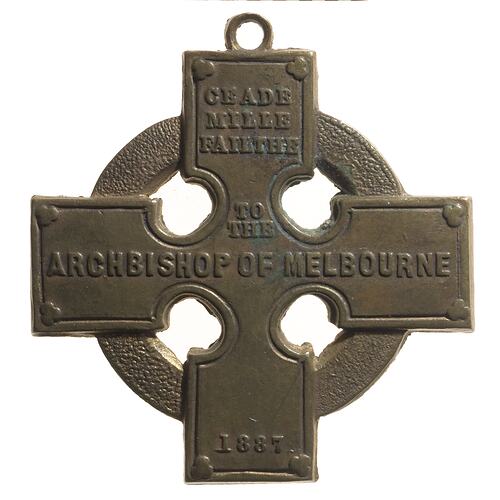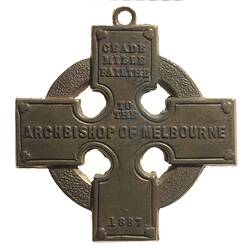Thomas Joseph Carr was born in Moylough, County Galway, Ireland, in 1839. He was educated at a Catholic college and was ordained as a priest in 1866, at the age of 27. He worked as curate, became a professor of dogmatic theology and in 1879 published an extensive work on recent developments in cannon law. He was devoted in his loyalty to Rome and lectured regularly on its historical claims. While an uninspiring and painstaking teacher, he had a keen interest in the welfare of the poor, perhaps influenced by the Irish famine during his childhood. He promoted the establishment of technical and industrial schools to provide people with skills to support themselves. In 1883 he was appointed to the bishopric of Galway.
Meanwhile in Melbourne, the Catholic church was experiencing problems, with difficult emperaments and a feeble organisation. Carr was offered the position of Archbishop of Melbourne and set sail for the Colony, arriving in June 1887. He was warmly received, and a medal was produced inscribed 'one hundred thousand welcomes'. With the booming economy in the period after his arrival, Carr was able to administer structural improvements to the church with relative ease and caused new churches, schools and convents to be built. He took a keen interest in the foundation of St Patrick's College, Manly, Sydney, insisting that priests needed to have achieved matriculation - from a Catholic school. Unfortunately, his parsimony meant that students needed to have independent means to support themselves during their study, a rarity in the Irish Australian family at that time. Carr promoted the Catholic education system, and co-founded Newman College, University of Melbourne, with Daniel Mannix. He also supported the construction of St Patrick's Cathedral, completed in 1897.
Carr maintained cordial relations with his political adversaries, and received letters of support from Catholics and non-Catholics alike when he spoke publicly against birth control. He also spoke in favour of Federation and attended the opening of Federal parliament in 1901. He supported child endowment, public housing, education for women and Aboriginal welfare. He helped found St Vincent's Hospital and a home for foundlings at Broadmeadows. He was also a strong supporter of temperance.
In 1913 Daniel Mannix was appointed his coadjutor, and Carr quickly handed him much of his administrative burden. Carr continued as a figure of quiet, balanced common sense who acted as a conciliatory agent and never let his Irish background hinder his interest in the consolidation of the Catholic church in Australia. Carr died in Melbourne in 1917 and was buried in St Patrick's Cathedral.
References:
Australian Dictionary of Biography website: http://adb.anu.edu.au/biography/carr-thomas-joseph-5511
More Information
-
Keywords
-
Localities
-
Authors
-
Article types

